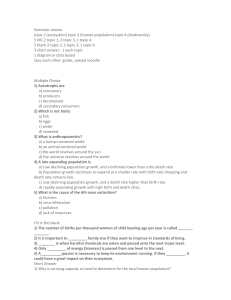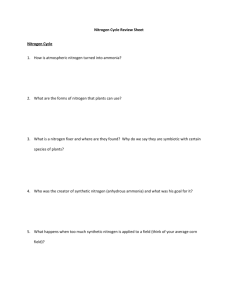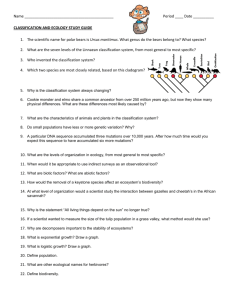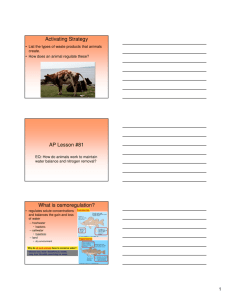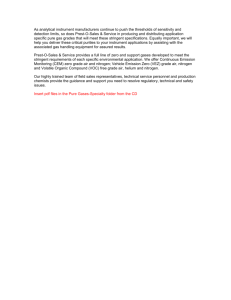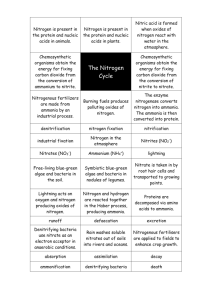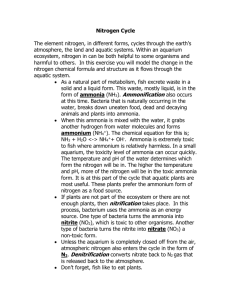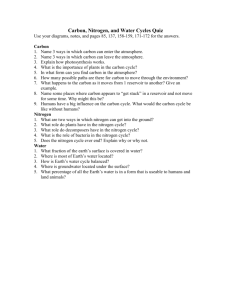World Competitiveness
advertisement
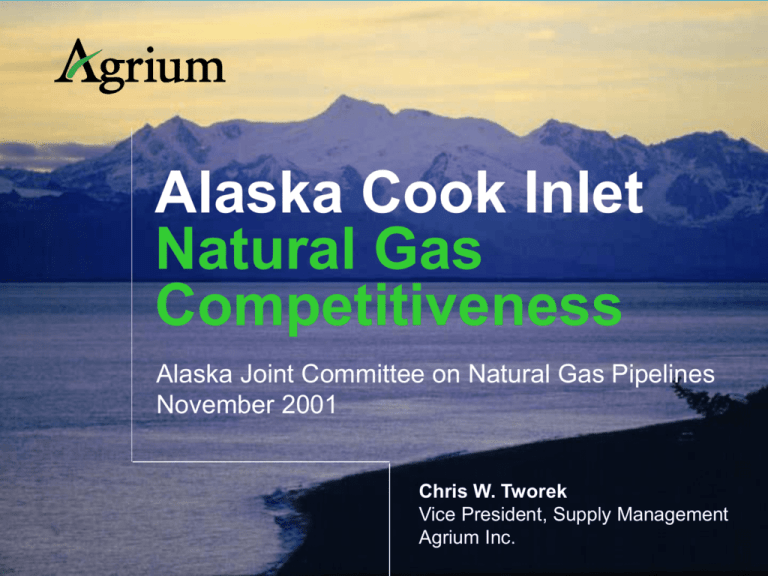
Alaska Cook Inlet Natural Gas Competitiveness Alaska Joint Committee on Natural Gas Pipelines November 2001 Chris W. Tworek Vice President, Supply Management Agrium Inc. Agenda The Company Kenai Nitrogen Operations World Competitiveness The Alaskan Situation Partners in Growth The Company Agrium is One of World’s Largest Fertilizer Manufactures 14 Production Facilities 11 million tons Second Largest Ag. Retailer in N.A. 226 Outlets Annual sales exceed US $2.0 Billion ( Retail 22% Nitrogen 48% Phosphate 5% Potash 20% Sulphate 5% The Company World Scale Facilities High Efficient / Low Cost Producer Strategically Located Near Key Markets Tidewater Access to International Markets Highly Skilled Workforce More Than 5000 Employees World Wide Committed to Safety & The Environment Kenai Nitrogen Operations Products 6% of N.A. Nitrogen Production • Ammonia - 700,000 (net) tons • Urea - 1.1 million tons 50-55 BCF/yr of Natural Gas Consumption Employees 300 Full-Time, Highly Skilled 30 Contractors on average Kenai Nitrogen Operations Primary Markets Ammonia – Pacific Rim Urea – Mexico, South America, Taiwan and Korea Competition FSU, South America, Trinidad and Pacific Rim Many new plants built in last decade World product prices tend to be capped by trapped gas economics Kenai Nitrogen Operations Community Investments Economic Benefits – over 130 M$/yr Large Local Employer • 300 Highly Skilled Employees Donations & Sponsorships • • • • Caring for The Kenai United Way Challenger Learning Center Boys & Girls Club, etc. Gas, Power and Pipeline* $70+ Other Local Wages & Spending Benefits $14 $25 Federal Property Taxes $18 Tax $3 *Includes Royalties Commitment to Safety & Environment World Competitiveness Nitrogen is a World Traded Commodity Easiest way to monetize & transport gas reserves • $15/t to 50/t ocean freight Recent high N.A. gas prices made N.A. Nitrogen production uneconomic N.A. Produces 14% of World’s Nitrogen* • Up to 50% of N production shut-in at peak • U.S. Nitrogen imports doubled • Gas producers lost sales for all industrial products * 20 M tons N - Ammonia, Urea, Nitrate, UAN solutions (2.0 - 2.3 BCF/d natural gas consumption) Importance of Natural Gas Ammonia takes 33.5 MMBTU per ton Gas is 75 – 90% of ammonia production cost World Feed (MMBTU/ton) Recent Prices N.A. 33.5 33.5 x 1.00 x 5.00 Variable Feed /ton $34 $168 Cash Conversion /ton $25 $25 Cash Production /ton $59 Gas Price ($/MMBTU) $100-190 $193 World Industrial Gas Cost Comparison Projections for 2001 (US$/MMBtu) Alaska $1.20-1.50 Western Europe $3.60 Canada FSU $4.50 $1.30 United States $5.00 Middle East $1.00 Trinidad $0.75-1.50 China $2.50 India $4.50 Indonesia/Malaysia $1.00-1.50 Latin America $0.60-1.50 Australia $1.00-1.30 High-Cost Source: CERA, BJ&A, Fertecon, Agrium Low-Cost The North America Balance 2001 vs 2000 (Crop Year) Normal Production Production reductions Increased imports Supply Market Demand Inventory Build Nitrogen (million st/yr) 19 (3) 3 19 18 1.0 Major Ammonia Exporters to North America ‘000 Tons of NH3 1,692 3,228 1,092 2,418 FSU 0 91 Middle East Trinidad 180 311 Latin America 1999/00 Source: USDC, Statistics Canada 2000/01 226 23 Asia Major Urea Exporters to North America ‘000 Tons of Urea 1,671 160 280 878 753 W. Europe 297 389 426 97 Trinidad 38 Africa 150 Latin America 1999/00 Source: USDC, Statistics Canada 2000/01 52 Middle East Asia Affect of High N.A. 2001 Gas Pricing Plant Shut Downs Up to 50% at Peak Gas Pricing Loss of Market Share Imports almost doubled $ 4-5 gas cannot compete against $1 gas Offshore competition won Gas Producers lost sales • N was about 0.75 of 3-5 BCF/d industrial demand destruction • High prices were not sustained The Alaskan Situation Cook Inlet Products are exported Fertilizer and LNG compete globally New industries (e.g. gas to liquids) will also have to compete internationally Our prices are based on international markets not lower 48 US$/ton NOLA $300 Black Sea $275 $250 New Orleans $225 $200 $175 $150 $125 $100 $75 World Market $50 $25 $0 Oct-93 Oct-94 Oct-95 Oct-96 Source: Green Markets, Blue Johnson Oct-97 Oct-98 Oct-99 Oct-00 Oct-01 The Alaskan Situation Jones Act restricts exports to lower 48 Act requires U.S. Flag vessels to move products among U.S. ports Cook Inlet Fertilizer is forced to go off-shore No U.S. flag ammonia vessels left Urea limited to 1-2 sea going barge Partners in Growth Expansion Opportunity Based On Cook Inlet Advantages: • Close to Pacific Rim markets • Good Business Climate & Skilled Workforce • World Scale Plant – Needs to expand to stay competitive Agrium uses 50-55 BCF/yr today • Expansion plans add up to 30 BCF/yr • Current base supply needs long term extension Partners in Growth Expansion Benefits to Alaska Grows Current Local Economic Contribution of $130 M annually Increases Sales/Exports Expands skilled employment Allows Greater Community Investment Increases Tax Base Encourages Gas Exploration Opens Up Other Industries to Export Markets Must Be Based on Competitiveness Reliable and Internationally Competitive Supply of Gas Partners in Growth Some Possible Solutions Spur from Alaska Gas Pipeline is long term advantageous solution Cook Inlet has immediate additional gas potential • Anchorage Economic Development Corp Report: 1-3 TCF to be found • Coal Bed Methane: 8 – 250 TCF • Escopeta: 5-18 TCF Partners in Growth Agrium willing to work with State and Producers to encourage development: Pre-investment on appropriate risk/reward: • Pre-bought gas production • Infrastructure investment (e.g. pipelines) • Exploration and drilling partnerships Exploration Royalty Relief Ongoing royalties based on actual contracts or weighted average sales prices Purchase of State Royalty Gas North Slope Spur Line In Closing… Successful partnering will: Continue Alaska’s development for all sectors • Building Cook Inlet strengthens base for mega projects such as Alaska Pipeline Contribute to Alaska’s export position Increase Agrium’s annual $130 M plus contribution to local economy November 2001
